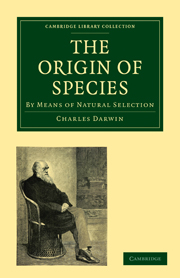 The Origin of Species
The Origin of Species Book contents
- Frontmatter
- Contents
- INSTRUCTION TO BINDER
- ADDITIONS AND CORRECTIONS, TO THE SIXTH EDITION
- HISTORICAL SKETCH
- INTRODUCTION
- CHAPTER I VARIATION UNDER DOMESTICATION
- CHAPTER II VARIATION UNDER NATURE
- CHAPTER III STRUGGLE FOR EXISTENCE
- CHAPTER IV NATURAL SELECTION; OR THE SURVIVAL OF THE FITTEST
- CHAPTER V LAWS OF VARIATION
- CHAPTER VI DIFFICULTIES OF THE THEORY
- CHAPTER VII MISCELLANEOUS OBJECTIONS TO THE THEORY OF NATURAL SELECTION
- CHAPTER VIII INSTINCT
- CHAPTER IX HYBRIDISM
- CHAPTER X ON THE IMPERFECTION OF THE GEOLOGICAL RECORD
- CHAPTER XI ON THE GEOLOGICAL SUCCESSION OF ORGANIC BEINGS
- CHAPTER XII GEOGRAPHICAL DISTRIBUTION
- CHAPTER XIII GEOGRAPHICAL DISTRIBUTION—continued
- CHAPTER XIV MUTUAL AFFINITIES OF ORGANIC BEINGS: MORPHOLOGY: EMBRYOLOGY: RUDIMENTARY ORGANS
- CHAPTER XV RECAPITULATION AND CONCLUSION
- GLOSSARY OF SCIENTIFIC TERMS
- INDEX
- Plate section
CHAPTER III - STRUGGLE FOR EXISTENCE
Published online by Cambridge University Press: 29 August 2010
- Frontmatter
- Contents
- INSTRUCTION TO BINDER
- ADDITIONS AND CORRECTIONS, TO THE SIXTH EDITION
- HISTORICAL SKETCH
- INTRODUCTION
- CHAPTER I VARIATION UNDER DOMESTICATION
- CHAPTER II VARIATION UNDER NATURE
- CHAPTER III STRUGGLE FOR EXISTENCE
- CHAPTER IV NATURAL SELECTION; OR THE SURVIVAL OF THE FITTEST
- CHAPTER V LAWS OF VARIATION
- CHAPTER VI DIFFICULTIES OF THE THEORY
- CHAPTER VII MISCELLANEOUS OBJECTIONS TO THE THEORY OF NATURAL SELECTION
- CHAPTER VIII INSTINCT
- CHAPTER IX HYBRIDISM
- CHAPTER X ON THE IMPERFECTION OF THE GEOLOGICAL RECORD
- CHAPTER XI ON THE GEOLOGICAL SUCCESSION OF ORGANIC BEINGS
- CHAPTER XII GEOGRAPHICAL DISTRIBUTION
- CHAPTER XIII GEOGRAPHICAL DISTRIBUTION—continued
- CHAPTER XIV MUTUAL AFFINITIES OF ORGANIC BEINGS: MORPHOLOGY: EMBRYOLOGY: RUDIMENTARY ORGANS
- CHAPTER XV RECAPITULATION AND CONCLUSION
- GLOSSARY OF SCIENTIFIC TERMS
- INDEX
- Plate section
Summary
Before entering on the subject of this chapter, I must make a few preliminary remarks, to show how the struggle for existence bears on Natural Selection. It has been seen in the last chapter that amongst organic beings in a state of nature there is some individual variability: indeed I am not aware that this has ever been disputed. It is immaterial for us whether a multitude of doubtful forms be called species or sub-species or varieties; what rank, for instance, the two or three hundred doubtful forms of British plants are entitled to hold, if the existence of any well-marked varieties be admitted. But the mere existence of individual variability and of some few well-marked varieties, though necessary as the foundation for the work, helps us but little in understanding how species arise in nature. How have all those exquisite adaptations of one part of the organisation to another part, and to the conditions of life, and of one organic being to another being, been perfected? We see these beautiful co-adaptations most plainly in the woodpecker and the misletoe; and only a little less plainly in the humblest parasite which clings to the hairs of a quadruped or feathers of a bird; in the structure of the beetle which dives through the water: in the plumed seed which is wafted by the gentlest breeze; in short, we see beautiful adaptations everywhere and in every part of the organic world.
- Type
- Chapter
- Information
- The Origin of SpeciesBy Means of Natural Selection, or the Preservation of Favoured Races in the Struggle for Life, pp. 48 - 61Publisher: Cambridge University PressPrint publication year: 2009First published in: 1859
- 2
- Cited by


